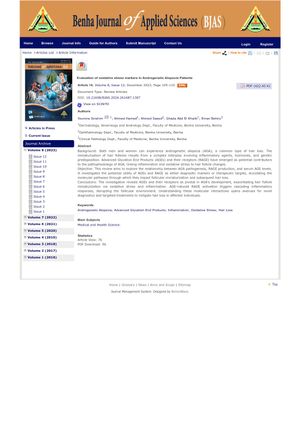Evaluation of Oxidative Stress Markers in Androgenetic Alopecia Patients
December 2023
in “
Benha Journal of Applied Sciences
”

TLDR AGEs and their receptors play a significant role in hair loss by causing inflammation and oxidative stress.
The review "Evaluation of oxidative stress markers in Androgenetic Alopecia Patients" explores the role of Advanced Glycation End Products (AGEs) and their receptors (RAGE) in the development of Androgenetic Alopecia (AGA), a common type of hair loss. The study reveals that AGEs and RAGE are key contributors to AGA, exacerbating hair follicle miniaturization through oxidative stress and inflammation. The activation of RAGE by AGEs triggers inflammatory responses that disrupt the follicular environment. This understanding of the molecular interactions involved in AGA opens up possibilities for new diagnostic methods and targeted treatments to reduce hair loss in affected individuals.




